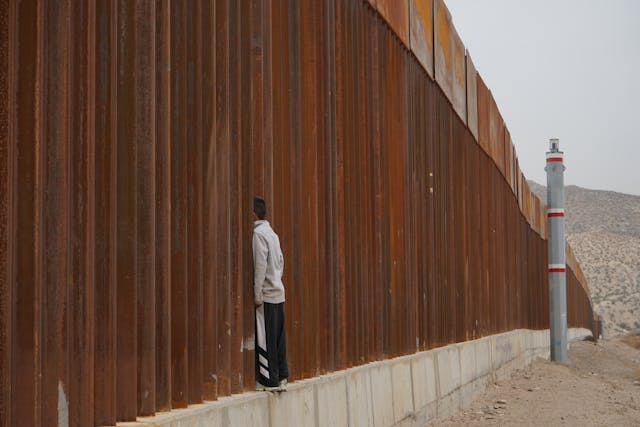This page may contain affiliate links, which means I may receive a commission from purchases made through links.
Politics these days often focus on immigration. With the rise of President Trump, this subject receives substantially more attention than many others. He has his talking points. His supporters do as well. And those who oppose his agenda, likewise, have their own. This post is going to be less about a political narrative and more about a biblical one. Sixty-six times the subject of “strangers” comes up in the Old Testament. More than anything I have to say about it, I thought it might be valuable to list out all the Scriptures in the Old Testament about how strangers living in Israel were to be treated and why.
There are a couple of different words used to describe immigrants in the Bible: toshab and ger. Toshab is much less common and more precisely connotes a temporary or vagrant type of inhabitant. It is often used alongside the more common ger, which more broadly refers to foreigners, aliens, or strangers. For simplicity, this post will focus on ger, but because of the conceptual overlap, many passages will include both. We will also always use the word “stranger” as a translation for the word, understanding that it typically refers to someone who is an outsider among the majority group in question.
For copyright purposes, I cannot quote such a large amount of Scripture in proportion to the amount of original content in this post. Instead, I will give a brief summary of those verses and link to each reference for the reader’s convenience.
Before Israel
Genesis 15:12-14 – God told Abraham in a dream that his descendants would be strangers in a foreign land and be servants. He then promised to rescue them from that nation.
Genesis 23:4 – Abraham told Hittites that he is a stranger among them and asked them for a place to bury his wife.
The Law of Moses
Exodus 2:22 – Moses named his son Gershom (a form of the word for stranger) because he himself grew up as a stranger in the land of Egypt.
Exodus 12:19-20 – As part of the Passover, no yeast should be in the household of either the Israelites or the strangers living among them, or they will be cut off from the people.
Exodus 12:48-49 – If a stranger wishes to eat the Passover meal, they and their household must all be circumcised. They will then become like the native Israelites. Uncircumcised people are not allowed to eat it. God says the law will be the same for natives and strangers.
Exodus 18:3 – This verse reiterates why Moses named his son Gershom, just like in 2:22.
Exodus 20:8-11 – God gives the fourth commandment to keep the Sabbath day. He commands this day to be kept by everyone: men, women, slaves, animals, and strangers.
Exodus 22:21 – Israel is commanded not to wrong or oppress strangers because they themselves were strangers in Egypt.
Exodus 23:9 – Again, they are told not to oppress strangers because they “know the heart” of a stranger, having been strangers in Egypt.
Exodus 23:12 – God says that the Sabbath is so that everyone, including the strangers, “may have rest” and “may be refreshed.”
Leviticus 16:29 – On the Day of Atonement, no one is allowed to work, including the strangers. They are under the same requirements of observation as the natives.
Leviticus 17:8-9 – Worshippers bringing offerings to God must bring it to the tent of meeting, or else they will be cut off from the people. This applies to both Israelites and strangers.
Leviticus 17:10-16 – Israelites and strangers are forbidden from eating blood under threat of being cut off. If they hunt, they must bleed out the animal completely. They may not eat animals that die on their own or by being killed by another animal. If they do, there is a washing ceremony for purification. These laws are for natives and strangers.
Leviticus 18:26-30 – Natives and strangers are likewise commanded to avoid the sexual and other sins listed earlier in the chapter. They are warned that the practices will defile their land and the land will “vomit [them] out.”
Leviticus 19:10 – Israelites harvesting from their vineyards must not gather fallen grapes. They are to leave them for the poor and the strangers.
Leviticus 19:33-34 – Israel must not commit any wrong against strangers, and they must love them as themselves, just as 19:18 tells them to love their neighbors.
Leviticus 20:2 – This prescribes the death penalty for natives or strangers who sacrifice their children to Molech.
Leviticus 22:17-20 – Israelites and strangers who want to offer a sacrifice to God must offer an animal without any blemishes.
Leviticus 23:22 – Israelites who harvest must leave the gleaning for the poor and stranger.
Leviticus 24:16 – Natives and strangers who blaspheme God’s name face the death penalty.
Leviticus 24:21-22 – Natives and strangers both get the death penalty for murder of a human, and both have to make restitution for the killing of an animal.
Leviticus 25:23 – Leading up to rules about stewarding and redeeming land in the Jubilee Year, God reminds Israel that they are strangers in his land.
Leviticus 25:35 – “If your brother becomes poor and cannot maintain himself with you, you shall support him as though he were a stranger and a sojourner, and he shall live with you.”
Leviticus 25:47-55 – This passage offers means of redemption if stranger becomes rich and an Israelite becomes his slave.
Number 9:14 – Strangers who wish to keep the Passover must do it according to the same regulations as natives.
Numbers 15:14-16 – Strangers and natives have the same rules for offerings.
Numbers 15:22-31 – Unintentional sins may be forgiven, but rebellion leads to being cut off. These apply to the native and stranger alike.
Numbers 19:10 – Laws about cleanness in this chapter are applied to both natives and strangers.
Numbers 35:15 – Strangers and natives are both permitted to escape to a refuge city if they kill without intent.
Deuteronomy 1:16-17 – Judges are required to judge cases justly, regardless of the class of the parties involved, whether stranger or brother.
Deuteronomy 5:12-15 – God reiterates keeping the Sabbath as a requirement for both Israelites and strangers.
Deuteronomy 10:18-19 – God works good for the stranger and widow and fatherless, and so should Israel, since they too were once strangers.
Deuteronomy 14:21 – Israelites are not permitted to eat naturally dying animals, but they can give or sell them to strangers. This appears to contradict Leviticus 17, but context matters. In Leviticus, God was preparing the people for their decades in the wilderness where food was scarce. He made a concession that they were preferred not to eat meat of animals that died naturally, but that if they did, they could be purified, as well as strangers among them. But here in Deuteronomy, God is preparing the next generation to enter the land of promise and prosperity, where the standard would be higher. They were now forbidden entirely from those meats. This is the first rule in the law where the expectation of the stranger is different. The stranger is now welcome to eat it, but presumably, they still need to be purified to make offerings as before.
Deuteronomy 14:28-29 – Levites, strangers, widows, and orphans all get to share in the tithe of Israel.
Deuteronomy 16:9-12 – Everyone, including strangers, is commanded to keep the Feast of Weeks.
Deuteronomy 16:13-14 – Everyone, including strangers, is commanded to keep the Feast of Booths.
Deuteronomy 23:7 – Israel is commanded not to hate Edomites, since they are brothers, nor Egyptians, because the Israelites were once strangers in their land.
Deuteronomy 24:14 – Israel must not oppress hired laborers, whether they are native or stranger.
Deuteronomy 24:17 – Israel must not pervert the justice due to strangers, orphans, or widows.
Deuteronomy 24:19-22 – When harvesting sheaves, olives, or grapes, the workers are not to go back for anything that gets missed. It is for the stranger, orphan, and widow.
Deuteronomy 26:11-13 – The people are to bring the tithe from their firstfruits, and they are to give it to the Levites, strangers, orphans, and widows.
Deuteronomy 27:19 – God pronounces a curse on anyone who perverts the justice due the stranger, orphan, or widow.
Deuteronomy 28:43 – One of the potential curses of Israel’s disobedience is that the strangers living among them will gain a higher status than them and that they will be of a lower position.
Deuteronomy 29:10-15 – The covenant God made with Israel is not with only those who were present for it but with everyone present and absent in the land, including men, women, children, and strangers.
Deuteronomy 31:9-13 – The people are commanded to gather once every seven years all together to read the law publicly, including men, women, children, and strangers.
Historical Narratives
Joshua 8:30-35 – Joshua renewed the covenant of Moses in the presence of all Israel, both strangers and natives.
Joshua 20:7-9 – Joshua and the people set apart 6 cities to be places of refuge for the one who accidentally kills another, per Number 35:15. This right to escape is offered to natives and strangers alike.
2 Samuel 1:13-14 – David has a stranger executed because he killed king Saul.
1 Chronicles 22:2 – King David commanded the gathering of all the strangers residing in the land for them to help prepare the building materials of the temple.
1 Chronicles 29:15 – While praying before the whole assembly of Israel, David recognizes that they are all strangers before God, just has their ancestors were.
2 Chronicles 2:17-18 – King Solomon commissioned the 153,600 resident strangers to work on the building of the temple.
2 Chronicles 30:25 – King Hezekiah celebrates the Passover with Israel for the first time since King David, and all the people, including strangers, rejoiced.
Poetry
Job 31:32 – Job is asserting his own righteousness, and as part of his list of good deeds, he expresses that he has kept his home open to lodge the stranger and the traveler.
Psalm 39:12 – David’s prayer to God recognizes he is a stranger with God, and a visitor in his presence.
Psalm 94:6-7 – Wicked people kill the orphan, widow, and stranger.
Psalm 119:19 – The psalmist recognizes their own status as a stranger on the earth.
Psalm 146:9 – God looks after and cares for the widow, orphan, and stranger.
Prophets
Isaiah 14:1 – God promises Israel that he will restore them to their own land. He then adds that strangers “will join them and will attach themselves to the house of Jacob.” In other words, when God bring Israelites back from exile, they will once again have these foreigners among them as a part of them.
Jeremiah 7:5-7 – Warning Judah about the coming exile, God gives them a promise that if they will repent and work justice, not oppressing the strangers, orphans, and widows, he will not exile them after all.
Jeremiah 14:8 – Because of impending judgment, Jeremiah expresses that to him God seems distant, like he cares nothing for the welfare of his nation, like a traveling stranger passing through for a day.
Jeremiah 22:3 – Jeremiah is told by God to command the king of Judah to what is right and just and save victims of robbery from their oppressors and to do no harm to strangers, orphans, and widows or take any innocent lives.
Ezekiel 14:6-8 – God says that either Israelites or strangers who practice idolatry but try to consult him will be opposed by him and cut off.
Ezekiel 22:7 – One of God’s accusations against Israel is that strangers are extorted.
Ezekiel 22:29 – Same accusations above: strangers are extorted, and they are not doing justice.
Ezekiel 47:22-23 – In a future return to the land of Israel, God commands that the strangers living among the Israelites be given a portion of the inheritance of Israel.
Zechariah 7:8-12 – God speaks through Zechariah to counsel the people to practice kindness and mercy, to not oppress widows, orphans, and strangers, and to not make evil plans against each other. He laments that they did not listen and hardened their hearts.
Malachi 3:5 – God promises a swift judgment against witches, adulterers, liars, oppressors of widows, orphans, and strangers, and those who don’t fear him.
What Are We To Do?
This is a lot of information, and if you have gotten this far, it tells me that you care what God has to say about how we ought to treat people. So what do we do with all this?
We wrestle with it.
While I might address biblical politics in more depth in other posts, here it is incredibly important that we take the time just to process Holy Scripture. It is impossible to know what it means if we don’t know what it says. And I am wrestling through this stuff as I write this. For too long I went along with the so-called “more Christian” party, assuming that Republicanism as we know it is the closest that we can get to being godly. But I was woefully wrong. I’m not saying there is no place for governments to care about protecting their citizens, but we need to think long and hard about the way we treat our neighbors, even the “undocumented” ones. The Word of Christ demands it.
Footnotes
*If you enjoyed this post, please comment your thoughts down below and consider subscribing to receive updates on new blog posts.



